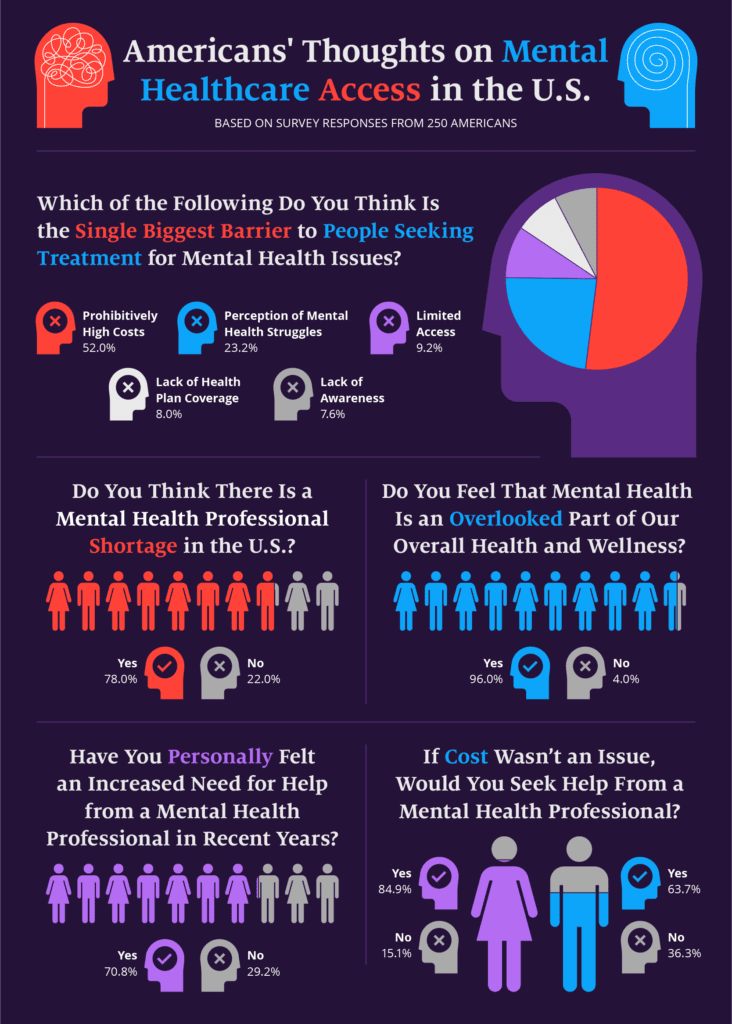Access to quality mental health care is critical for the well-being of everyone, no matter where they come from, gender, health, or socio-economic status. However, a significant challenge exists in many cities across the United States. There is a severe shortage of mental health providers, which makes it next to impossible to access the care. This is terrible news for over 70% of Americans who have acknowledged an increase in their need for help from a mental health professional.
According to a recent report by Assurance, the shortage of mental health providers is not something we should be ignoring. The report sheds light on the top 10 cities in the United States that are impacted by the mental health care shortage, emphasizing the urgent need to address this crisis and providing practical solutions to improve access to care.
(Image one inserted here about how Americans feel about health care)
The Top 10 cities With the Worst Mental Health Care Access
- Birmingham, AL
- Phoenix, AZ
- Orlando, FL & San Antonio, TX
- Jacksonville, FL
- Atlanta, GA
- Miama, FL
- Memphis, TN
- Dallas, TX
- Houston, TX
- Las Vegas, NV
Limited access to mental health providers results in extended wait times, a lack of treatment options, and higher costs for patients, which is almost guaranteed to worsen their mental health condition and could have long-lasting impacts on both themselves and their families.
(image two inserted here, about the top 10 best and worst cities)
Addressing the Mental Health Care Shortage
The mental health care shortage is a significant challenge, and addressing it requires a multifaceted approach. To begin with, there is a need to increase funding for mental health programs, as this can help attract more mental health providers to underserved areas. This could involve providing financial incentives for mental health professionals to work in these areas, which would help bridge the gap in mental health care access.
Telemedicine Options for Mental Health Care
Expanding telemedicine options for mental health care is another practical solution that can help improve access to care. Telemedicine has emerged as a valuable tool for mental health care providers to deliver quality care to patients remotely. It can help patients overcome geographical barriers, reduce wait times, and enable providers to reach underserved areas.
Mental Health Awareness
Community outreach programs and mental health awareness campaigns can also help eliminate the stigma surrounding mental health issues and encourage people to seek the care they need, regardless of their background. Partnerships with community organizations, schools, and workplaces can increase awareness about mental health issues and available resources.
Addressing the mental health care shortage requires a collaborative effort from stakeholders in the healthcare industry – policymakers, health systems, insurance providers, and mental health professionals. Policymakers can enact laws that promote mental health care access, while health systems can develop innovative solutions to improve access to care. Insurance providers can ensure that mental health care services are covered and reimbursed adequately, while mental health professionals can work collaboratively to improve the quality of care delivered.
In short, the TL/DR – the mental health care shortage in the United States is a complex issue that affects people from all backgrounds and age groups. The top 10 cities in the United States with the worst mental health care access highlight the need to address this crisis urgently. Implementing practical solutions such as increasing funding for mental health programs, offering incentives for mental health professionals to work in underserved areas, expanding telemedicine options for mental health care, and community outreach programs and mental health awareness campaigns can help improve access to quality mental health care. By working collaboratively, stakeholders in the healthcare industry can address the mental health care shortage and improve the lives of millions of Americans.






























